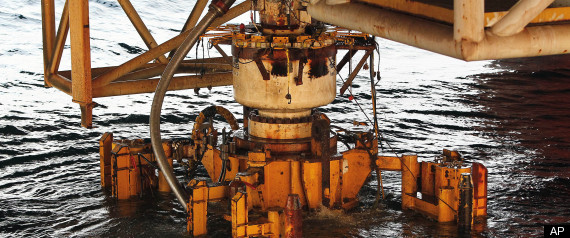 The Environmental Protection Agency is setting the first drinking water standard for a toxic rocket fuel ingredient linked to thyroid problems in pregnant women and young children, the Obama administration is to announce on Wednesday.
The Environmental Protection Agency is setting the first drinking water standard for a toxic rocket fuel ingredient linked to thyroid problems in pregnant women and young children, the Obama administration is to announce on Wednesday.
Environmental Protection Agency administrator Lisa Jackson will say that setting the standard will spark new technologies to clean up drinking water, according to a press release obtained by The Associated Press. Based on monitoring conducted from 2001 to 2005, 153 drinking water sources in 26 states contain perchlorate. The standard could take up to two years to develop.
EPA to limit rocket fuel chemical in tap water
Polar bear's long swim illustrates ice melt
 In one of the most dramatic signs ever documented of how shrinking Arctic sea ice impacts polar bears, researchers at the U.S. Geological Survey in Alaska have tracked a female bear that swam nine days across the deep, frigid Beaufort Sea before reaching an ice floe 426 miles offshore.
In one of the most dramatic signs ever documented of how shrinking Arctic sea ice impacts polar bears, researchers at the U.S. Geological Survey in Alaska have tracked a female bear that swam nine days across the deep, frigid Beaufort Sea before reaching an ice floe 426 miles offshore.
The marathon swim came at a cost: With little food likely available once she arrived, the bear lost 22% of her body weight and her year-old female cub, who set off on the journey but did not survive, the researchers said.
2 million fish found dead in Maryland
 The investigation comes days after the deaths of an estimated 100,000 fish in northwest Arkansas. Authorities suspect disease was to blame there, a state spokesman said.
The investigation comes days after the deaths of an estimated 100,000 fish in northwest Arkansas. Authorities suspect disease was to blame there, a state spokesman said.
"The affected fish are almost exclusively juvenile spot fish, 3 to 6 inches in length," the Maryland department said. A recent survey "showed a very strong population of spot in the bay this year. An increased juvenile population and limited deep water habitat would likely compound the effects of cold water stress."
Gulf Oil Spill Blowout Preventer Testing Could Be Compromised
 The U.S. government disclosed Friday it is investigating whether a Transocean worker's handling of a key a piece of evidence in the Gulf oil spill probe affected the integrity of the examination of the device.
The U.S. government disclosed Friday it is investigating whether a Transocean worker's handling of a key a piece of evidence in the Gulf oil spill probe affected the integrity of the examination of the device.
Michael Bromwich, director of the Bureau of Ocean Energy Management, Regulation and Enforcement, said in a letter to U.S. Rep. Ed Markey that his investigators have questioned workers from various government agencies and a Norwegian firm the government hired to test the failed blowout preventer.
The Drug Store in Your Tap Water
 Water taken near a Nebraska feedlot had four times the trenbolone levels as other water samples and male fathead minnows nearby had low testosterone levels and small heads.
Water taken near a Nebraska feedlot had four times the trenbolone levels as other water samples and male fathead minnows nearby had low testosterone levels and small heads.
Nor do you have to see a doctor to imbibe a witch's brew of prescriptions like pain pills, antibiotics and psychiatric, cholesterol, asthma, epilepsy and heart meds in your drinking water, says the AP. Free of charge.
For Many Species, No Escape as Temperature Rises
 Simon Joakim Kiiru remembers a time not long ago when familiar birdsongs filled the air here and life was correlated with bird sightings. His lush, well-tended homestead is in the highlands next to the Aberdare National Park, one of the premier birding destinations in the world.
Simon Joakim Kiiru remembers a time not long ago when familiar birdsongs filled the air here and life was correlated with bird sightings. His lush, well-tended homestead is in the highlands next to the Aberdare National Park, one of the premier birding destinations in the world.
When the hornbill arrived, Mr. Kiiru recalled, the rains were near, meaning that it was time to plant. When a buzzard showed a man his chest, it meant a visitor was imminent. When an owl called at night, it foretold a death.
Bye Bye Blackbird: USDA acknowledges a hand in one mass bird death
 The United States Department of Agriculture (USDA) took responsibility for hundreds of dead starlings that were found on the ground and frozen in trees in a Yankton, S.D., park on Monday.
The United States Department of Agriculture (USDA) took responsibility for hundreds of dead starlings that were found on the ground and frozen in trees in a Yankton, S.D., park on Monday.
The USDA's Wildlife Services Program, which contracts with farmers for bird control, said it used an avicide poison called DRC-1339 to cull a roost of 5,000 birds that were defecating on a farmer's cattle feed across the state line in Nebraska. But officials said the agency had nothing to do with large and dense recent bird kills in Arkansas and Louisiana.
More Articles...
- Call for UK to ban pesticides linked to bee deaths
- Mark Ruffalo's Crusade Against Fracking: 'The World Is Leaving Us Behind'
- Obama administration cracks down on mountaintop mining
- Thousands of fish washed up in Chicago and hundreds of birds perish in California as animal deaths continue to bemuse scientists
Page 147 of 201

 Environmental Glance
Environmental Glance






























